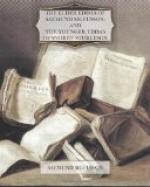132. If thou wilt induce a good woman to pleasant converse, thou must promise fair, and hold to it: no one turns from good if it can be got.
133. I enjoin thee to be wary, but not over wary; at drinking be thou most wary, and with another’s wife; and thirdly, that thieves delude thee not.
134. With insult or derision treat thou never a guest or wayfarer. They often little know, who sit within, of what race they are who come.
135. Vices and virtues the sons of mortals bear in their breasts mingled; no one is so good that no failing attends him, nor so bad as to be good for nothing.
136. At a hoary speaker laugh thou never; often is good that which the aged utter, oft from a shriveled hide discreet words issue; from those whose skin is pendent and decked with scars, and who go tottering among the vile.
137. I counsel thee, etc. Rail not at a guest, nor from thy gate thrust him; treat well the indigent; they will speak well of thee.
138. Strong is the bar that must be raised to admit all. Do thou give a penny, or they will call down on thee every ill in thy limbs.
139. I counsel thee, etc. Wherever thou beer drinkest, invoke to thee the power of earth; for earth is good against drink, fire for distempers, the oak for constipation, a corn-ear for sorcery, a hall for domestic strife. In bitter hates invoke the moon; the biter for bite-injuries is good; but runes against calamity; fluid let earth absorb.
FOOTNOTES:
[Footnote 14: Odin is the “High One.” The poem is a collection of rules and maxims, and stories of himself, some of them not very consistent with our ideas of a supreme deity.]
[Footnote 15: In the Copenhagen paper Ms. F. this strophe begins with the following three lines:—
Wit is needful
to him who travels far:
harm seldom befalls the wary:
They are printed in the Stockholm edition of the original Afzelius and Bask, and in the Swedish translation by Afzelius.]
[Footnote 16: The sense of this line seems doubtful; I have adopted the version of Finn Magnusen.]
[Footnote 17: The public meeting.]
[Footnote 18: That is dead on the funeral pyre.]
[Footnote 19: This line is evidently an interpolation.]
[Footnote 20: Odln.]
[Footnote 21: From this line it appears that the poem is of Norwegian or Swedish origin, as the reindeer was unknown in Iceland before the middle of the 18th century, when it was Introduced by royal command.]
[Footnote 22: The story of Odin and Billing’s daughter is no longer extant; but compare the story of Odin and Rinda in Saxo, p. 126, edit. Muller & Veleschow.]
[Footnote 23: In the pagan North oaths were taken on a holy ring or bracelet, as with us on the Gospels, a sacred ring being kept in the temple for the purpose.]




